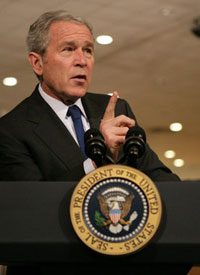
He also made several statements reiterating the painfully obvious, like a middle school student replying to the teacher after not studying for a civics quiz:
A definition of a sustainable cease-fire is that Hamas stops firing rockets into Israel. And there will not be a sustainable cease-fire if they continue firing rockets.
{modulepos inner_text_ad}
Bush even made reporters attending the press conference recall his words on the FY05 Defense Appropriations Act. At that time, Bush said: “Our enemies are innovative and resourceful, and so are we. They never stop thinking about new ways to harm our country and our people, and neither do we.”
Bush spoke about the challenges Barack Obama will face as President. But out of his mouth came words that could be understood two entirely different ways: “The stakes are high. There is an enemy that still is out there. You know, people can maybe try to write that off as, you know, he’s trying to set something up. I’m telling you there’s an enemy that would like to attack America, Americans, again. There just is. That’s the reality of the world. And I wish him all the very best.”
Reporters asked Bush what the disappointments of his presidency were. Verbal malapropisms were not among the disappointments he listed. Instead, he said: “Not having weapons of mass destruction was a significant disappointment. I don’t know if you want to call those mistakes or not, but they were — things didn’t go according to plan, let’s put it that way.” And you thought Bush didn’t want Saddam Hussein to have weapons of mass destruction? No, it was a “disappointment.”
But don’t criticize Bush for such disappointments, because he won’t get any new information after making a decision. At least that’s what he told reporters:
One thing about the presidency is that you can make — only make decisions, you know, on the information at hand. You don’t get to have information after you’ve made the decision.
Is it possible that the White House staff withheld information from Bush after the decision to go into Iraq? It almost sounds like that’s what Bush is saying. Would that explain the mess in the Middle East, the record deficit, and the emergent economic depression?
But the best summary of the eight years of his presidency came from this statement of free market principles. “And I readily concede I chunked aside some of my free market principles when I was told by chief economic advisors that the situation we were facing could be worse than the Great Depression.”
The only way a free-market constitutionalist could criticize the statement, other than the grammar, would be to question whether Bush ever held free-market principles in the first place. He did not support free-market principles when he lobbied Congress for his prescription drup entitlement program, or his stimulus plan, or the $700 billion bailout of the financial institutions. His record reveals no evidence he ever possessed free-market principles to “chunk.”
— Photo: whitehouse.gov


